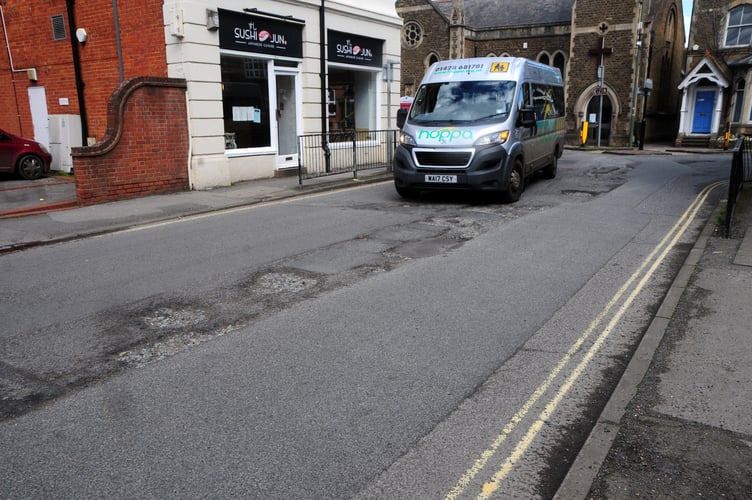Permanent repairs of Farnham town centre’s pothole-plagued roads are unlikely to be undertaken until the roll-out of the Farnham Infrastructure Programme’s town centre improvements next winter, a Surrey County Council official has said.
The road surface in South Street and Union Road, directly outside the town council offices, continues to deteriorate at a rapid rate after first breaking up in bad weather during January.
Residents and councillors have called for an urgent permanent fix amid concern for the safety of motorists, cyclists and pedestrians, after temporary ‘defect repairs’ by Surrey Highways contractors in February had little effect.
But in an email to David Quick, owner of Borelli’s Wine Yard, a Surrey Highways officer confirmed “full resurfacing treatment” has been deferred from this year’s Operation Horizon highway maintenance programme “due to major projects work in Farnham town centre”.
This major project work, which includes reversing sections of the one-way system and permanently widening some pavements, is not scheduled to begin until ‘winter 2023/24’ after modelling and detailed design work.

The county official added they are unable to provide a date for resurfacing and will continue to carry out defect repairs in line with the council’s Highway Safety Defect Policy.
They added Surrey’s potholes had been made worse by a spell of “prolonged frost rain” this winter, with more than 5,000 customer enquiries regarding potholes received in February alone.
Responding, Mr Quick said Farnham’s potholes are a result of a lack of maintenance over a much longer period, not just this winter, and added: “South Street needs urgent repairing now certainly NOT next year.”
The business owner has since written to Surrey County Council leader Tim Oliver to demand action – a copy of which is included on Page 17 of this week's Herald.
Pothole compensation payouts
It was revealed last month that Surrey County Council has spent more than £800,000 in pothole compensation payouts in the last five years.
In that time it repaired about 221,456 potholes along its rundown road network, at an average of 121 per day.
It was also announced in late March that the Government was to give the county £3 million to tackle the problem, but some say this is “just a drop in the ocean” compared with how much the road budget falls in future years.

County hall’s finances this year include a capital fund of £69.8 million for highways maintenance as part of a front-loaded £188m that was announced in February.
That is set to fall back to £29.5m a year – for the next four years – much more in line with the spending under its previous highways strategy which has led to the roads we have today.
It was also announced that individual councillor allowances of £100,000 to spend in their divisions would go, meaning any individual projects earmarked by members can not go ahead.
If highway’s can not be maintained, the opposition leader at Surrey County Council warned, then the roads will fall into further disrepair and the number of potholes, and motorists insurance claims, will rocket.

Councillor Will Forster said: “The cut to is to the road maintenance budget, this will mean the road surfaces will get worse.
“The cut is notable in the next financial year 24/25 and makes the £3m to repair the potholes from the Government look like a drop in the ocean.”
In 2018, Surrey County Council paid out £399,189 in compensation payments for claims relating to potholes – on both carriage and footway.
This declined to £135,949 in 2019 and was followed by two years where people were off the roads during the pandemic £83,415 and £79,364 in 2020 and 2021 – before climbing again as roads got busier in 2022 to £118,553.
These figures, the council said, relate to both property damage and personal injury with the “best endeavours” made to only include compensation payouts, however, “some figures may also include elements of legal costs and disbursements.”
A spokesperson for Surrey County Council said the road maintenance, capital, budget agreed by council in February totalled £188m for the next five years.
They added that the budget was front loaded, because work had been accelerated in order to realise the benefits sooner.




